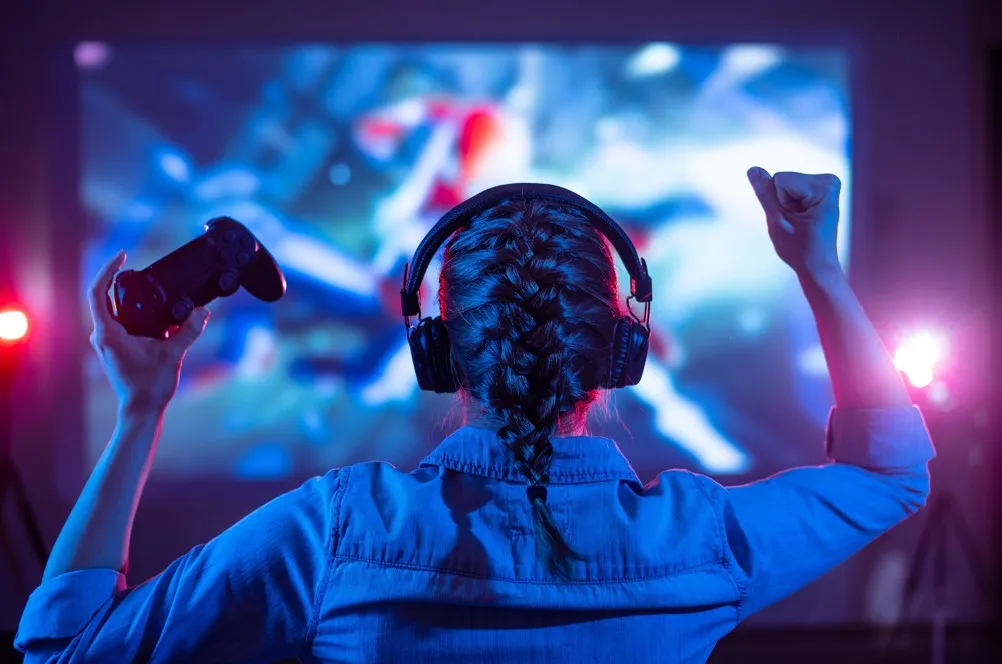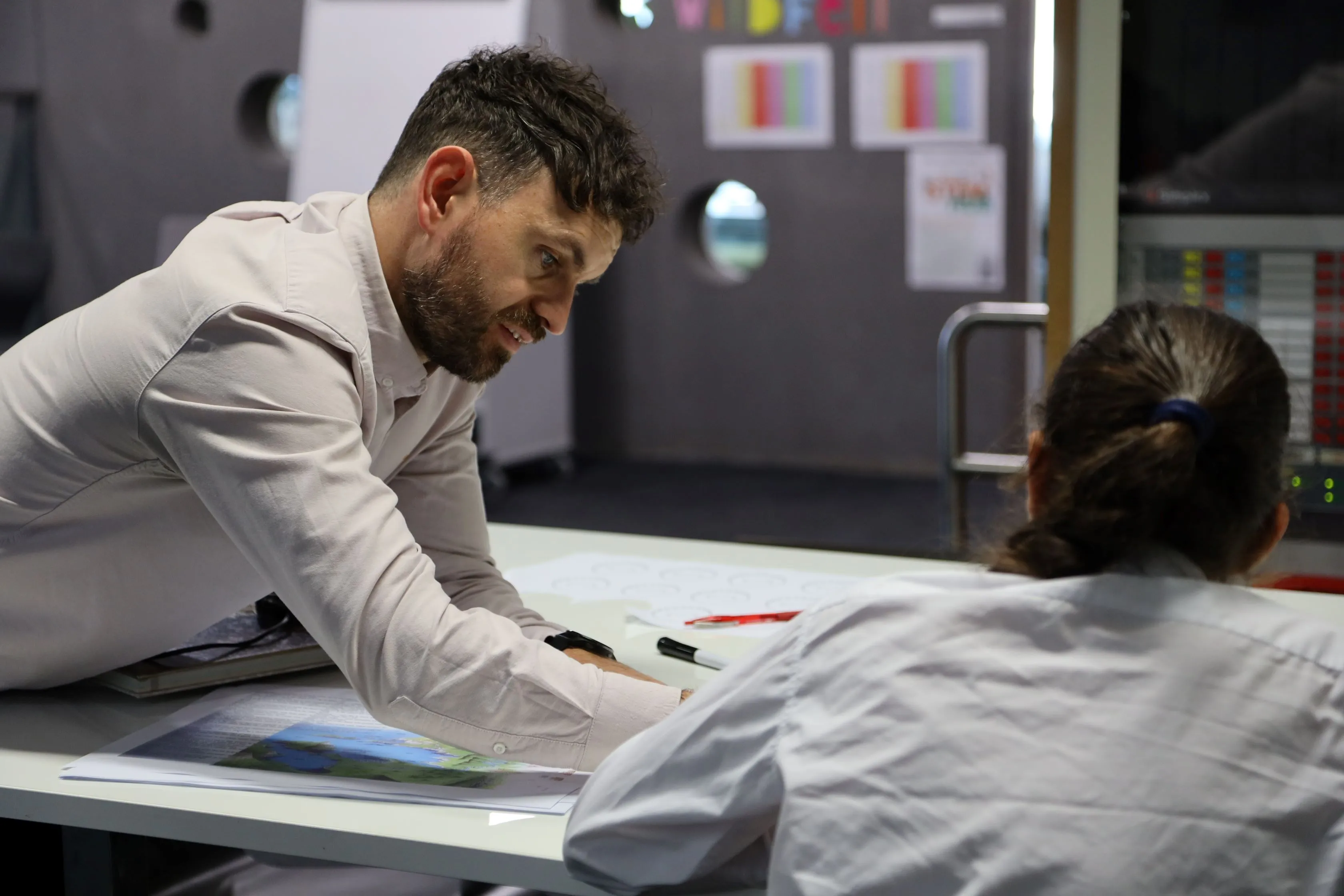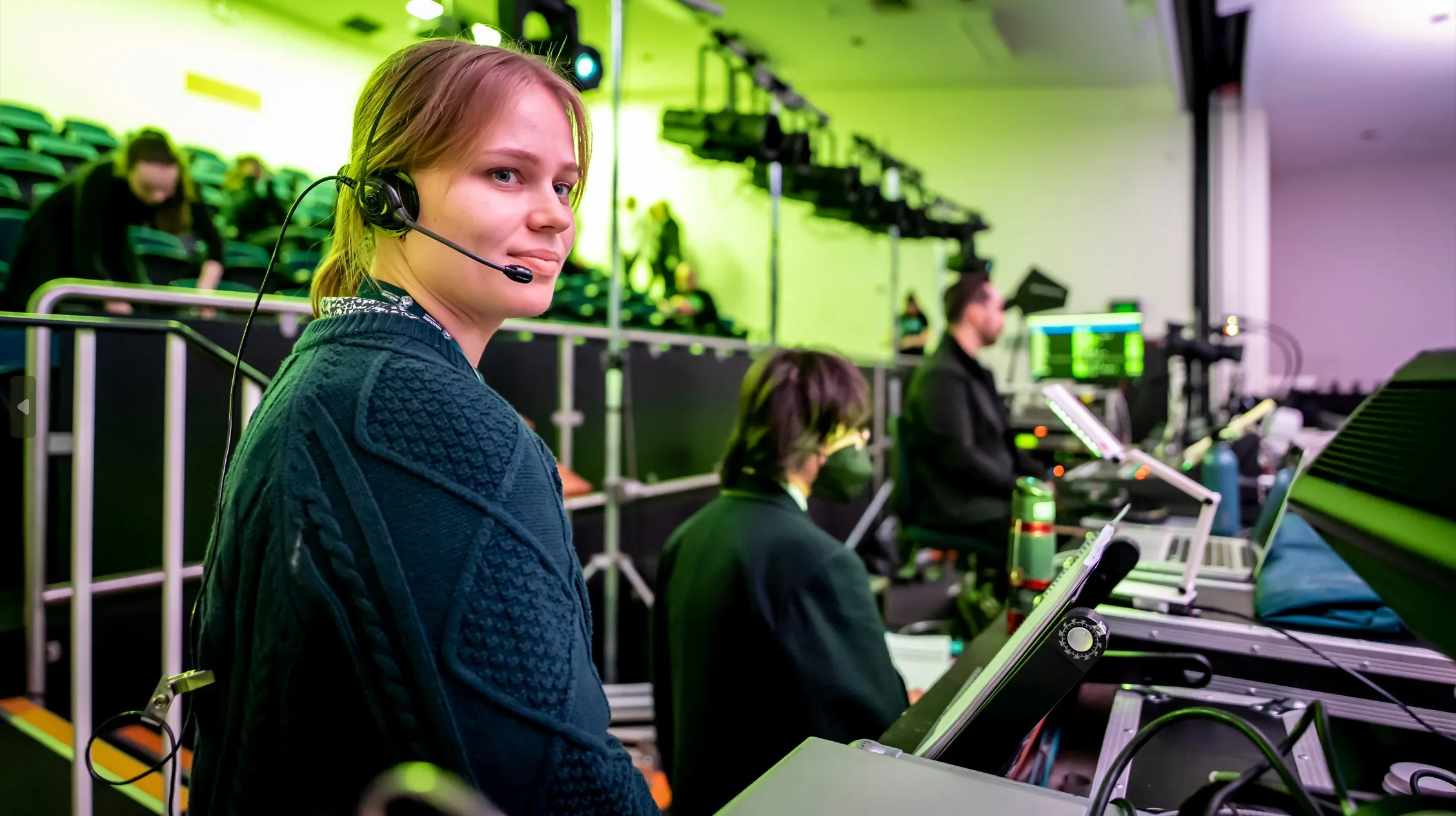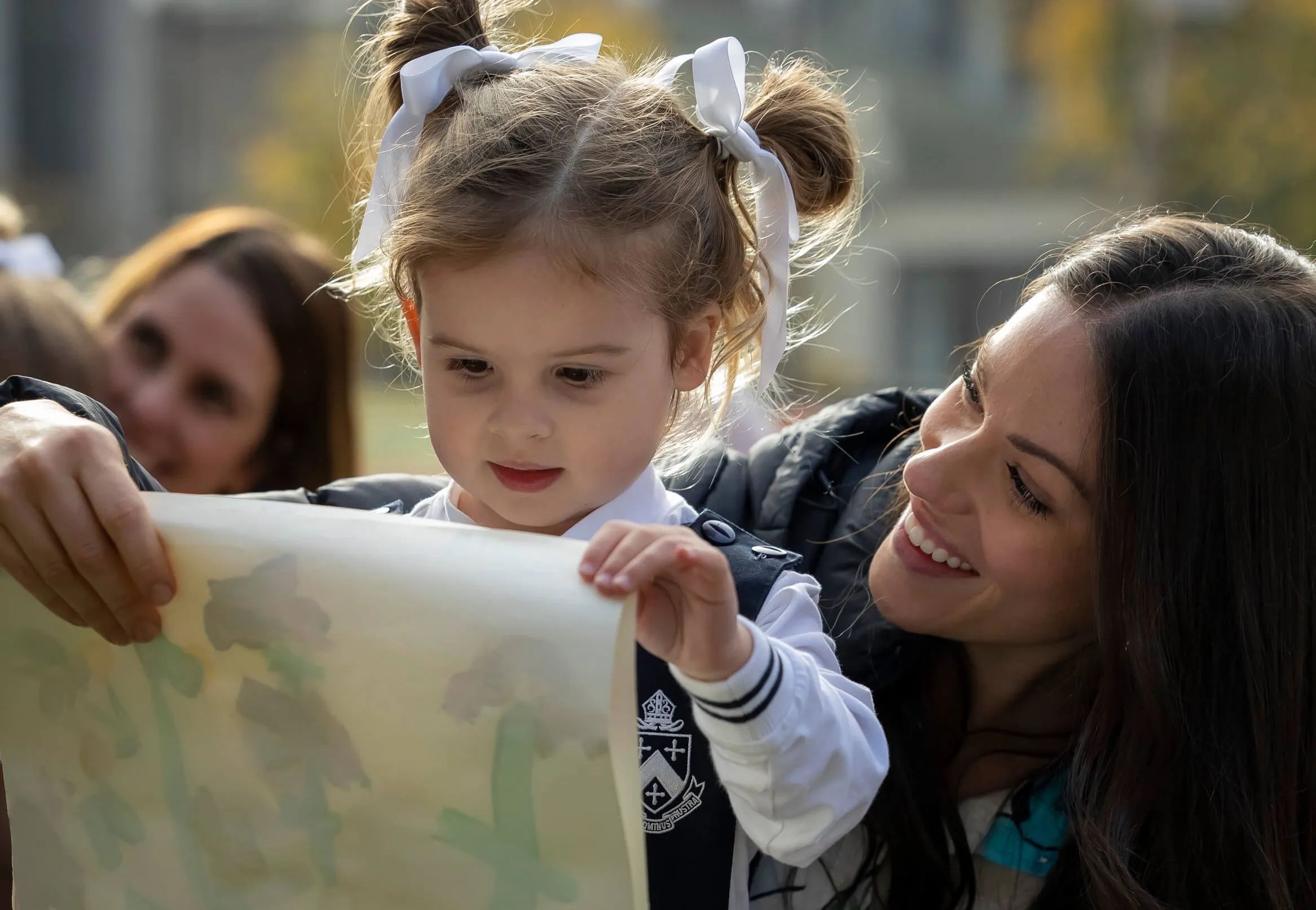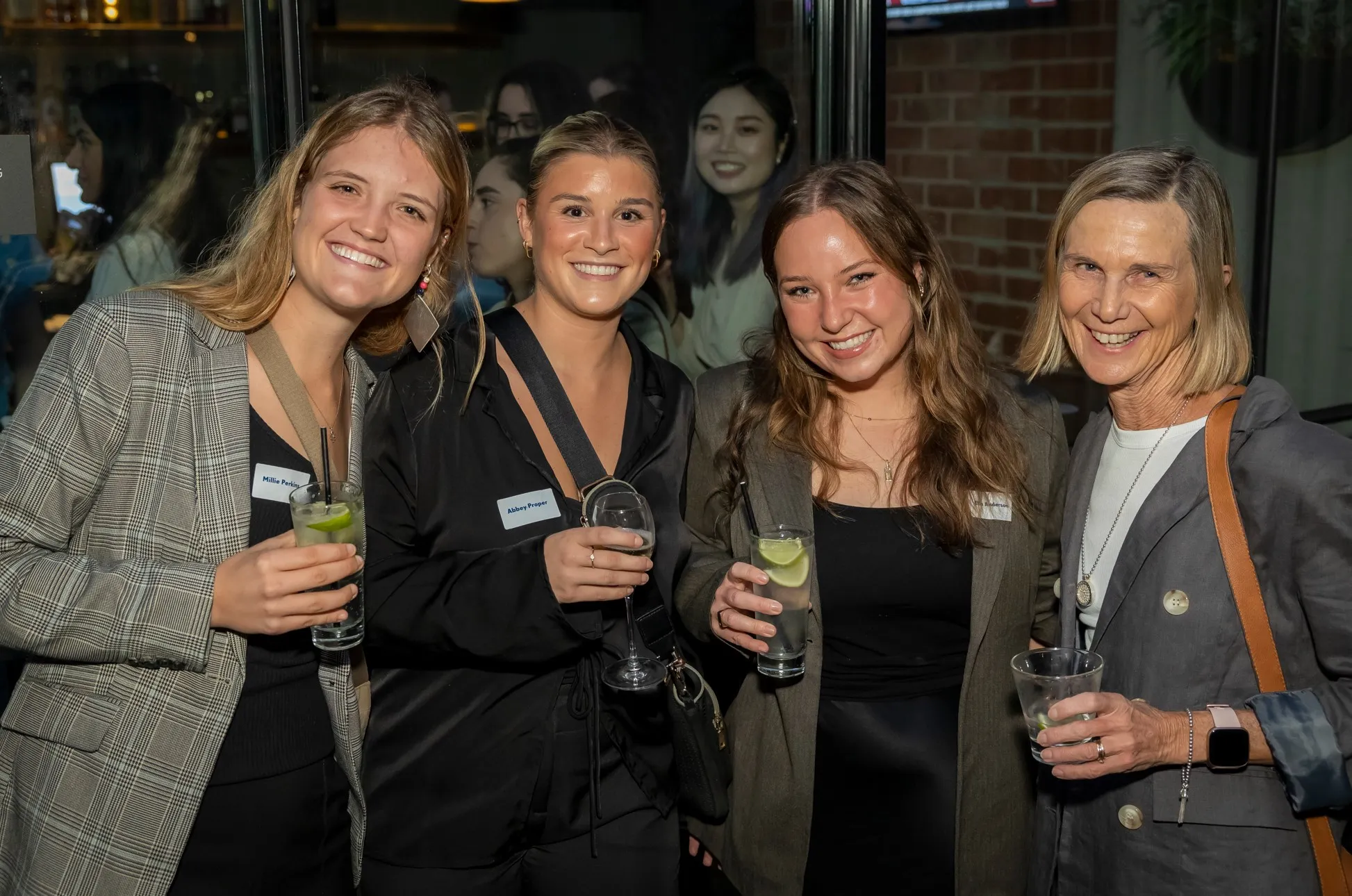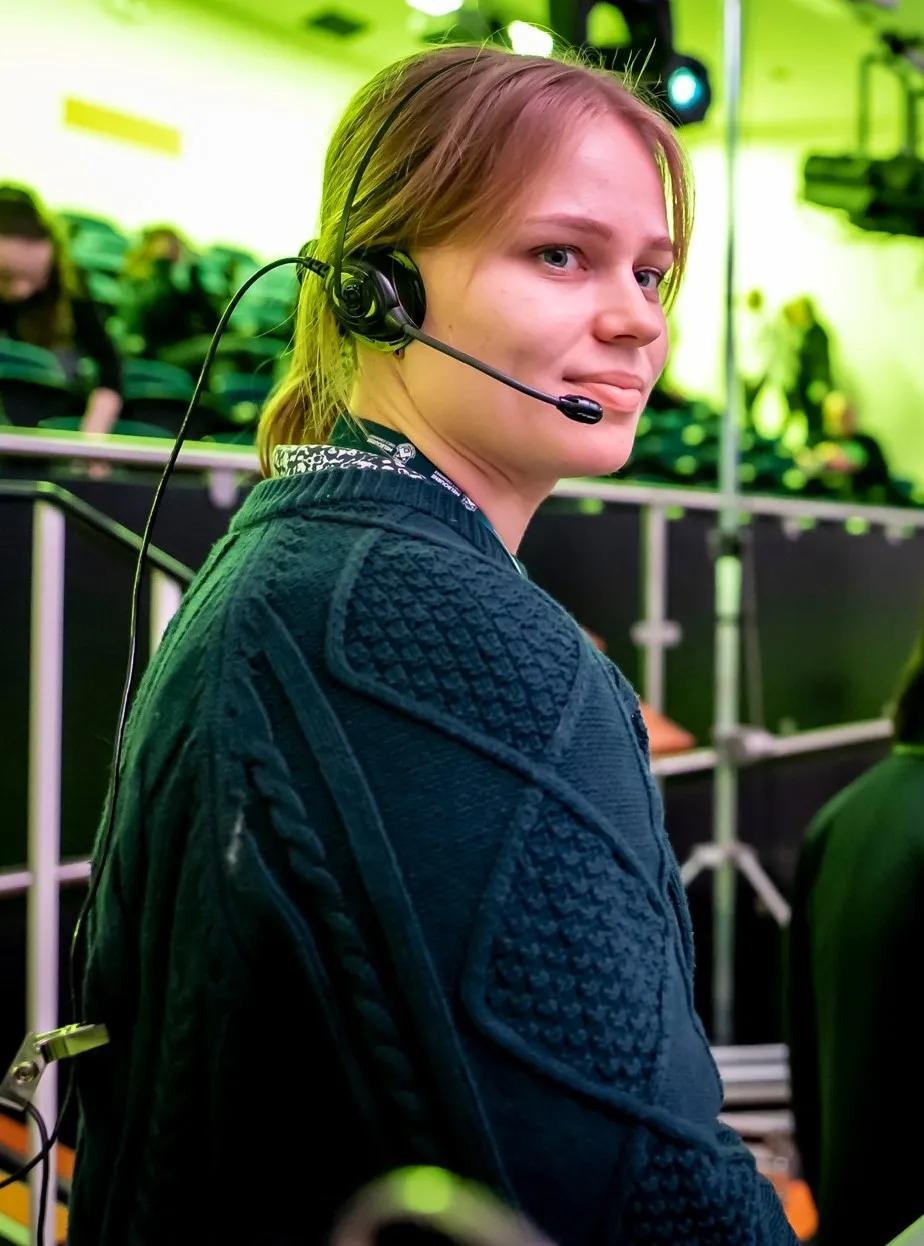

LIGHTS, CAMERA, ACTION.


LIGHTS, CAMERA, ACTION.
Lights, Camera, Action: The Show Can't Go on Without the Backstage Crew
When it comes to the theatre, it's easy to focus on the talent of the stage performers and forget about the effort that is put in behind the scenes. So for this article, we're redirecting the spotlight to the backstage crew.

“While the phrase 'the show must go on' may be a standard, it often diminishes the hard-working efforts of cast, crew and creatives.”
- Isabella T, Year 11.
When it comes to the theatre, it’s no secret that the backstage crew are hidden in the dark. As the name suggests, those behind the curtain aren’t sharing the spotlight with performers, and this lack of visibility tends to mean they literally fade to black.
Live theatre relies on the dedication, adaptability and innovation of the backstage crew. For this reason, MGGS’s stage productions would be impossible without the commitment of our Backstage Club.
The Club was devised in 2020 for students interested in learning about behind-the-scenes processes such as lighting, costumes, props and sound.
"We found ourselves on Zoom calls with many amazing lighting designers, costume designers, and many other people who hold important roles in the theatre and the TV/movie world,” Backstage Club member Isabella T says about the group’s inception.
“It has been incredibly inspiring to listen to the stories of some of the people who have had phenomenal careers. This inspiration then helped us when we returned to campus and started learning hands-on in Ross Hall. Our marvellous technician Mark Thompson taught us all he knows.”
“While the phrase 'the show must go on' may be a standard, it often diminishes the hard-working efforts of cast, crew and creatives.”
- Isabella T, Year 11.
When it comes to the theatre, it’s no secret that the backstage crew are hidden in the dark. As the name suggests, those behind the curtain aren’t sharing the spotlight with performers, and this lack of visibility tends to mean they literally fade to black.
Live theatre relies on the dedication, adaptability and innovation of the backstage crew. For this reason, MGGS’s stage productions would be impossible without the commitment of our Backstage Club.
The Club was devised in 2020 for students interested in learning about behind-the-scenes processes such as lighting, costumes, props and sound.
"We found ourselves on Zoom calls with many amazing lighting designers, costume designers, and many other people who hold important roles in the theatre and the TV/movie world,” Backstage Club member Isabella T says about the group’s inception.
“It has been incredibly inspiring to listen to the stories of some of the people who have had phenomenal careers. This inspiration then helped us when we returned to campus and started learning hands-on in Ross Hall. Our marvellous technician Mark Thompson taught us all he knows.”
“While the phrase 'the show must go on' may be a standard, it often diminishes the hard-working efforts of cast, crew and creatives.”
- Isabella T, Year 11.
When it comes to the theatre, it’s no secret that the backstage crew are hidden in the dark. As the name suggests, those behind the curtain aren’t sharing the spotlight with performers, and this lack of visibility tends to mean they literally fade to black.
Live theatre relies on the dedication, adaptability and innovation of the backstage crew. For this reason, MGGS’s stage productions would be impossible without the commitment of our Backstage Club.
The Club was devised in 2020 for students interested in learning about behind-the-scenes processes such as lighting, costumes, props and sound.
"We found ourselves on Zoom calls with many amazing lighting designers, costume designers, and many other people who hold important roles in the theatre and the TV/movie world,” Backstage Club member Isabella T says about the group’s inception.
“It has been incredibly inspiring to listen to the stories of some of the people who have had phenomenal careers. This inspiration then helped us when we returned to campus and started learning hands-on in Ross Hall. Our marvellous technician Mark Thompson taught us all he knows.”
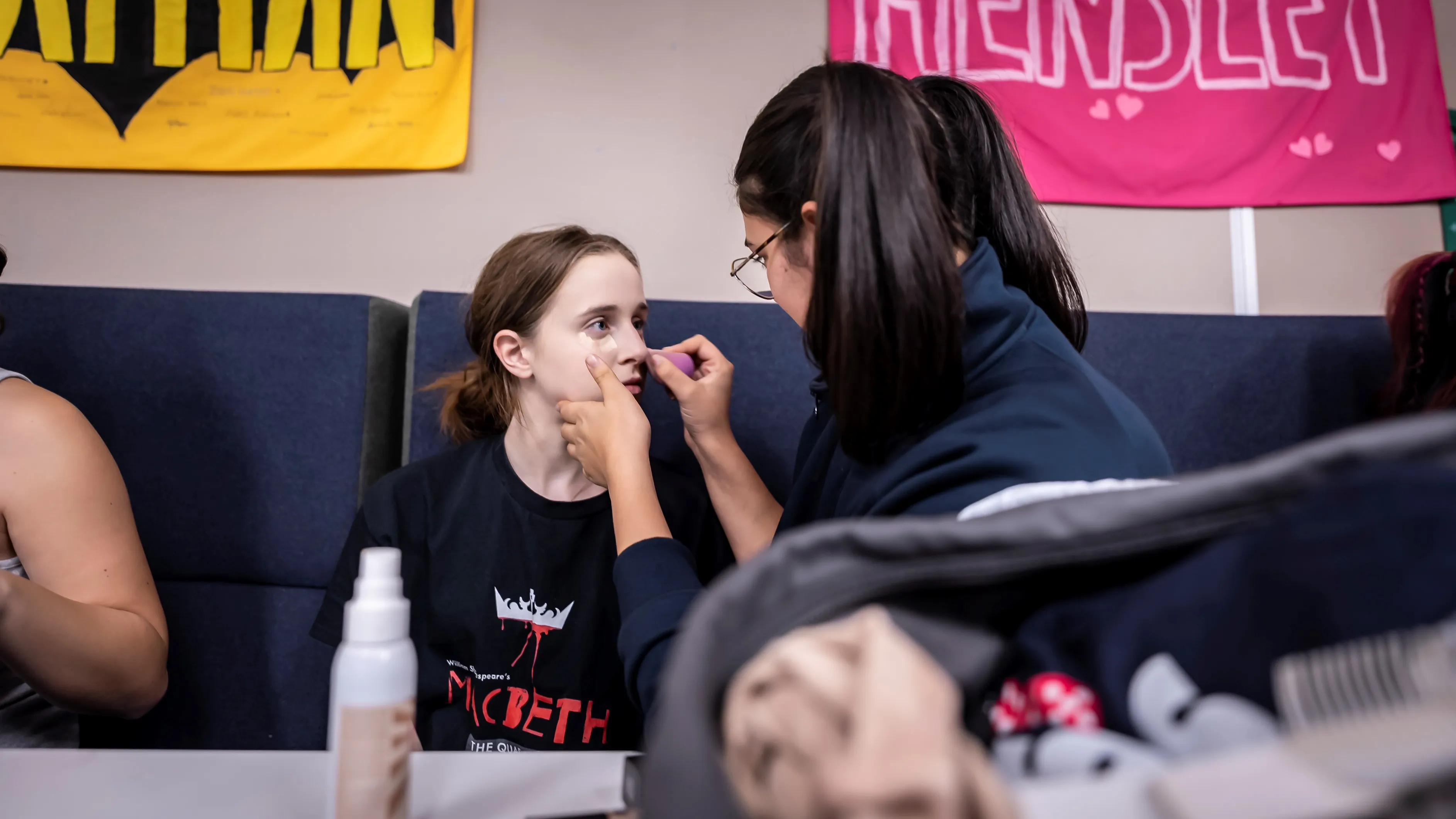

One of our Mamma Mia! leads getting her makeup done.



One of our Mamma Mia! leads getting her makeup done.
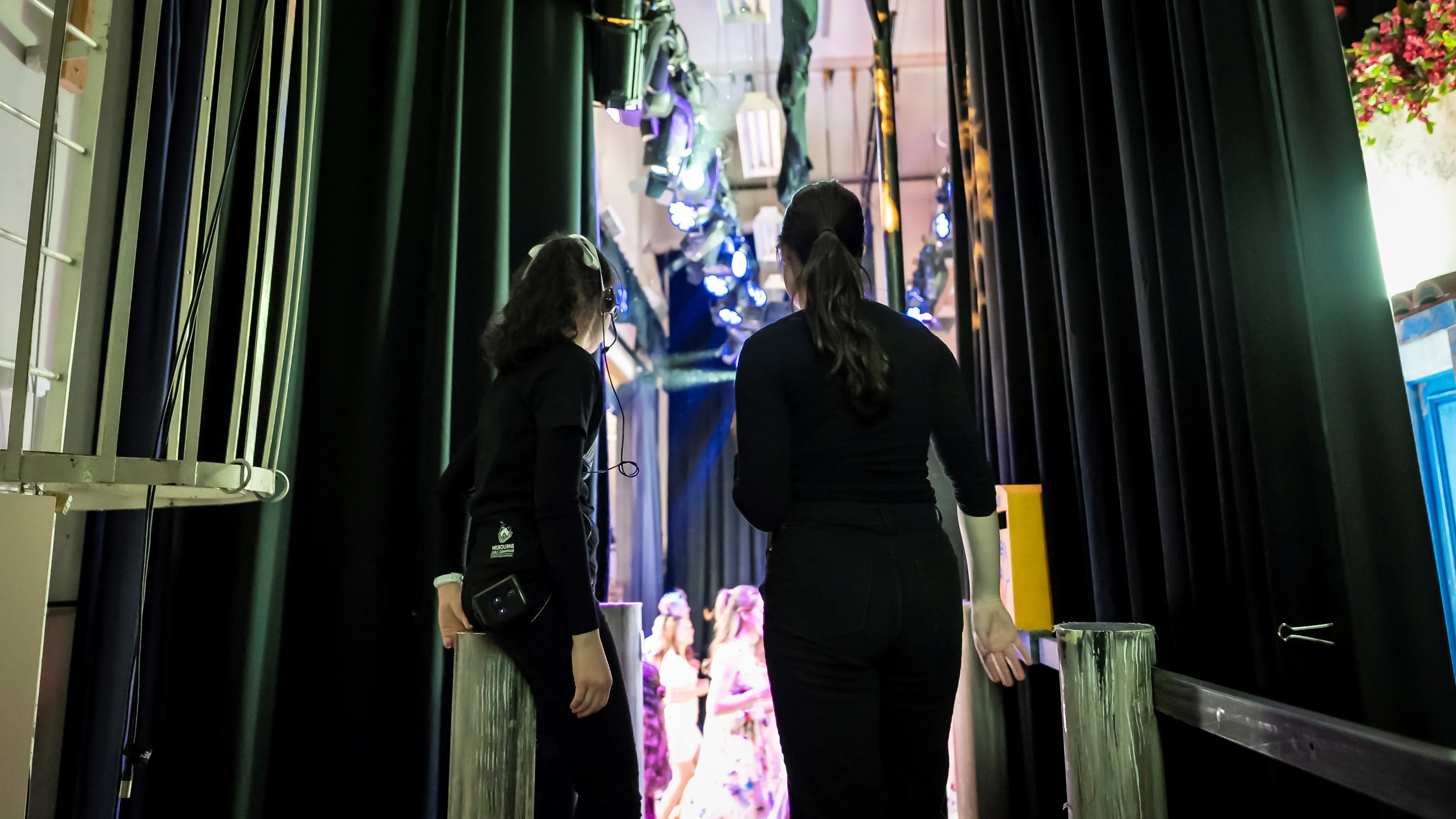

Members of the backstage crew waiting in the wings.
Thompson was initially hired as a theatre manager and video editor. He has a background in audio mixing and lighting, along with costume design and video editing. Currently, Thompson controls most AV work at MGGS, with the students’ help to set up live performances and assemblies.
"We run (Backstage Club) at lunchtimes,” he explains. “We have an enthusiastic group of Grammarians who assist with lighting and audio, as well as stage management; they help the actors with microphones and sound-checks, and ensure all props are ready to be accessed. They are in constant communication via headsets to the balcony crew.”
Various staff have supported the Club alongside Thompson and concede that work behind the curtain is harder than performing.
Indeed, they assert that behind the scenes is where the real drama takes place,” outlining the many roles and responsibilities of the backstage crew.
Before any performance, all sets and props are to be accounted for and, on top of this, health and safety are integral. This means sweeping floors of the set to rid them of hazardous debris, testing door handles, stairs, rails, wheels, wheel-locks, and safety mechanisms, and safe-proofing props that may have become hazardous due to wear and tear.
The cast are instructed to be in costume ready for our microphone technician and assistants to mic up and test each microphone. While this is happening, backstage crew who have been appointed sound operators are running sound tests and going over notes from previous performances, while lighting operators and spotters are hastily running through lighting cues to ensure no lights are damaged or lighting cues are missing.
Thompson was initially hired as a theatre manager and video editor. He has a background in audio mixing and lighting, along with costume design and video editing. Currently, Thompson controls most AV work at MGGS, with the students’ help to set up live performances and assemblies.
"We run (Backstage Club) at lunchtimes,” he explains. “We have an enthusiastic group of Grammarians who assist with lighting and audio, as well as stage management; they help the actors with microphones and sound-checks, and ensure all props are ready to be accessed. They are in constant communication via headsets to the balcony crew.”
Various staff have supported the Club alongside Thompson and concede that work behind the curtain is harder than performing.
Indeed, they assert that behind the scenes is where the real drama takes place,” outlining the many roles and responsibilities of the backstage crew.
Before any performance, all sets and props are to be accounted for and, on top of this, health and safety are integral. This means sweeping floors of the set to rid them of hazardous debris, testing door handles, stairs, rails, wheels, wheel-locks, and safety mechanisms, and safe-proofing props that may have become hazardous due to wear and tear.
The cast are instructed to be in costume ready for our microphone technician and assistants to mic up and test each microphone. While this is happening, backstage crew who have been appointed sound operators are running sound tests and going over notes from previous performances, while lighting operators and spotters are hastily running through lighting cues to ensure no lights are damaged or lighting cues are missing.
Thompson was initially hired as a theatre manager and video editor. He has a background in audio mixing and lighting, along with costume design and video editing. Currently, Thompson controls most AV work at MGGS, with the students’ help to set up live performances and assemblies.
"We run (Backstage Club) at lunchtimes,” he explains. “We have an enthusiastic group of Grammarians who assist with lighting and audio, as well as stage management; they help the actors with microphones and sound-checks, and ensure all props are ready to be accessed. They are in constant communication via headsets to the balcony crew.”
Various staff have supported the Club alongside Thompson and concede that work behind the curtain is harder than performing.
Indeed, they assert that behind the scenes is where the real drama takes place,” outlining the many roles and responsibilities of the backstage crew.
Before any performance, all sets and props are to be accounted for and, on top of this, health and safety are integral. This means sweeping floors of the set to rid them of hazardous debris, testing door handles, stairs, rails, wheels, wheel-locks, and safety mechanisms, and safe-proofing props that may have become hazardous due to wear and tear.
The cast are instructed to be in costume ready for our microphone technician and assistants to mic up and test each microphone. While this is happening, backstage crew who have been appointed sound operators are running sound tests and going over notes from previous performances, while lighting operators and spotters are hastily running through lighting cues to ensure no lights are damaged or lighting cues are missing.
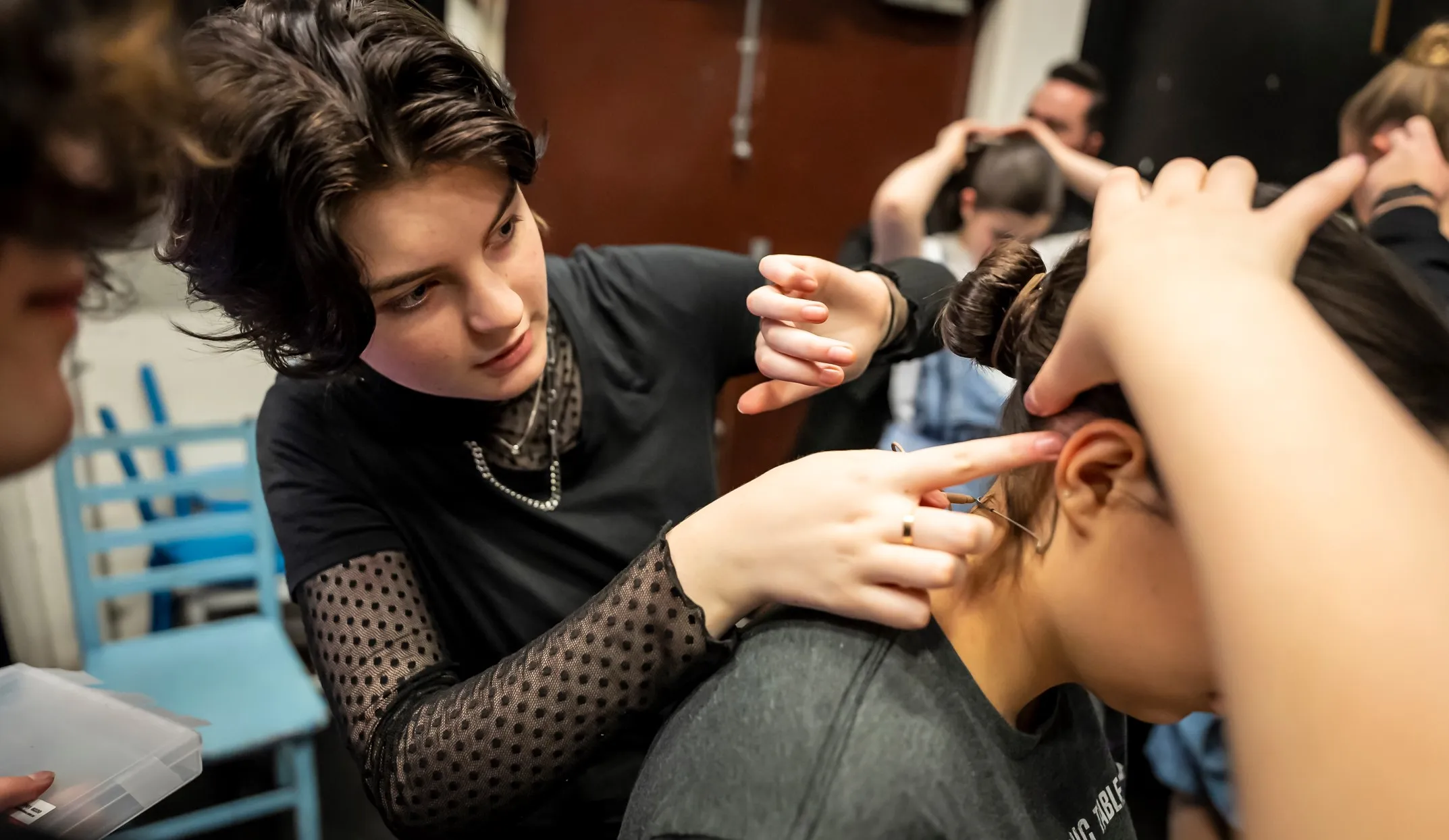

A backstage crew member attaching a performer's microphone.



A backstage crew member attaching a performer's microphone.
With headsets on and our stage manager leading the charge, the cast will be sent up from their dressing rooms to their first positions, whilst our set/prop movers make some last-minute checks side stage, in anticipation of the endless “shhh-ing” that awaits. This volume of responsibility, while daunting, allows Backstage Club members to gain invaluable skills for the future.
Isabella T, who was the stage manager for the School’s most recent production Mamma Mia! explains that, along with the obvious technical skills, working backstage has improved her ability to communicate with multiple parties simultaneously.
“These skills act as a foundation that opens many other opportunities," Isabella says.
Drama staff concur that working backstage helps to build interpersonal skills: teamwork, responsibility, accountability, attention-to-detail, discipline, organisation, communication, adaptability, maturity, camaraderie, listening, frantic waving, singing and lip reading! Skills that are sure to put MGGS students in good stead for their careers beyond school.
"On-stage performances demands creative and innovative problem-solving because of the time pressures.”
- Olivia Wilson, Acting Head of Drama
One of the Backstage Club’s more innovative solutions occurred ahead of this year’s House Drama production. Each MGGS House – Blackwood, Clarke, Hensley, Mungo, and Taylor – was given a different famous painting as a stimulus for their respective performances.
Clarke, the eventual winners, were given Banksy’s, Girl with the Red Balloon. Naturally, the students wanted to include a helium balloon as one of their props. But this proved harder than anticipated.
With headsets on and our stage manager leading the charge, the cast will be sent up from their dressing rooms to their first positions, whilst our set/prop movers make some last-minute checks side stage, in anticipation of the endless “shhh-ing” that awaits. This volume of responsibility, while daunting, allows Backstage Club members to gain invaluable skills for the future.
Isabella T, who was the stage manager for the School’s most recent production Mamma Mia! explains that, along with the obvious technical skills, working backstage has improved her ability to communicate with multiple parties simultaneously.
“These skills act as a foundation that opens many other opportunities," Isabella says.
Drama staff concur that working backstage helps to build interpersonal skills: teamwork, responsibility, accountability, attention-to-detail, discipline, organisation, communication, adaptability, maturity, camaraderie, listening, frantic waving, singing and lip reading! Skills that are sure to put MGGS students in good stead for their careers beyond school.
"On-stage performances demands creative and innovative problem-solving because of the time pressures.”
- Olivia Wilson, Acting Head of Drama
One of the Backstage Club’s more innovative solutions occurred ahead of this year’s House Drama production. Each MGGS House – Blackwood, Clarke, Hensley, Mungo, and Taylor – was given a different famous painting as a stimulus for their respective performances.
Clarke, the eventual winners, were given Banksy’s, Girl with the Red Balloon. Naturally, the students wanted to include a helium balloon as one of their props. But this proved harder than anticipated.
With headsets on and our stage manager leading the charge, the cast will be sent up from their dressing rooms to their first positions, whilst our set/prop movers make some last-minute checks side stage, in anticipation of the endless “shhh-ing” that awaits. This volume of responsibility, while daunting, allows Backstage Club members to gain invaluable skills for the future.
Isabella T, who was the stage manager for the School’s most recent production Mamma Mia! explains that, along with the obvious technical skills, working backstage has improved her ability to communicate with multiple parties simultaneously.
“These skills act as a foundation that opens many other opportunities," Isabella says.
Drama staff concur that working backstage helps to build interpersonal skills: teamwork, responsibility, accountability, attention-to-detail, discipline, organisation, communication, adaptability, maturity, camaraderie, listening, frantic waving, singing and lip reading! Skills that are sure to put MGGS students in good stead for their careers beyond school.
"On-stage performances demands creative and innovative problem-solving because of the time pressures.”
- Olivia Wilson, Acting Head of Drama
One of the Backstage Club’s more innovative solutions occurred ahead of this year’s House Drama production. Each MGGS House – Blackwood, Clarke, Hensley, Mungo, and Taylor – was given a different famous painting as a stimulus for their respective performances.
Clarke, the eventual winners, were given Banksy’s, Girl with the Red Balloon. Naturally, the students wanted to include a helium balloon as one of their props. But this proved harder than anticipated.
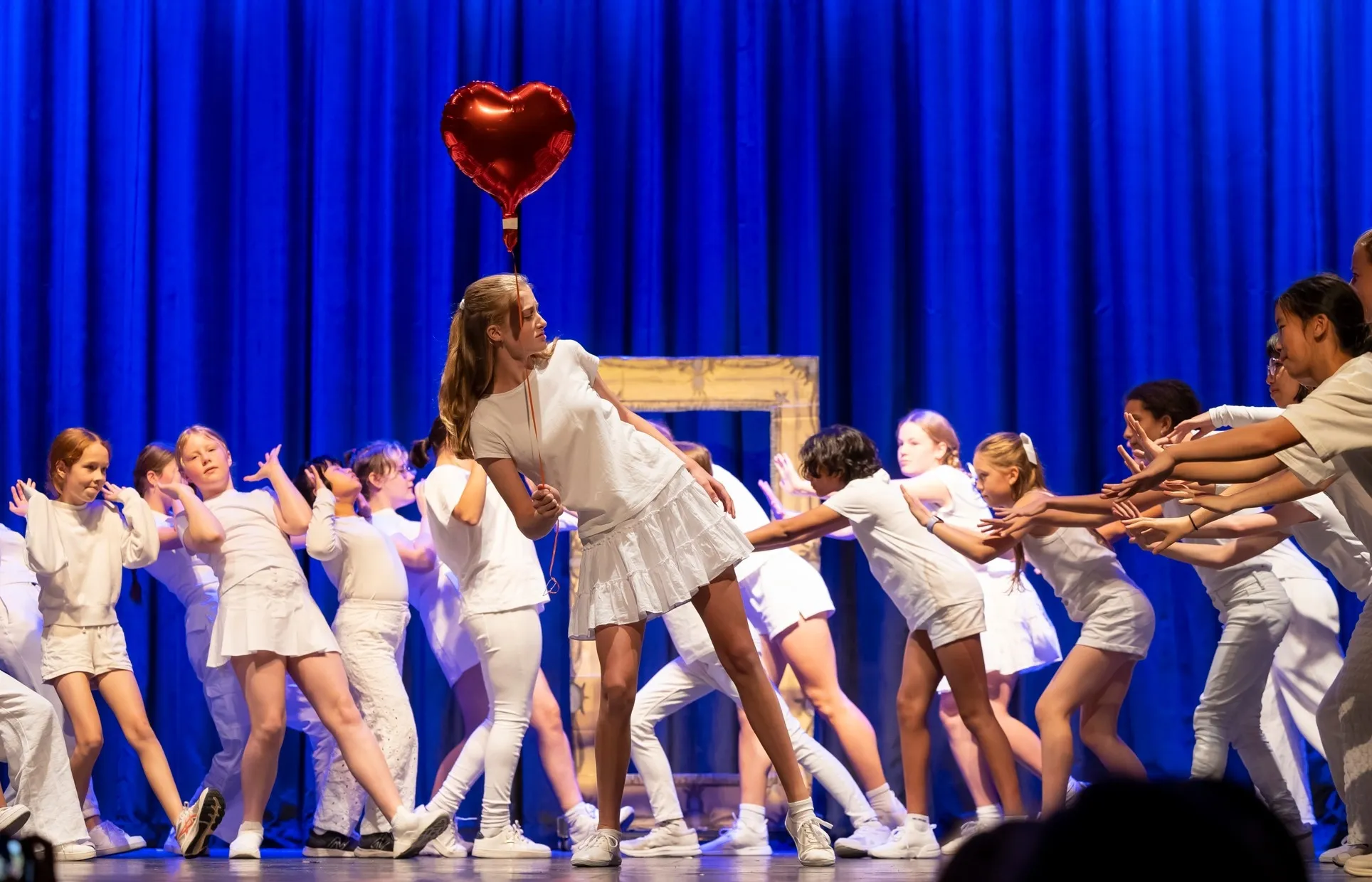

One of these props was harder to source than it may seem.



One of these props was harder to source than it may seem.
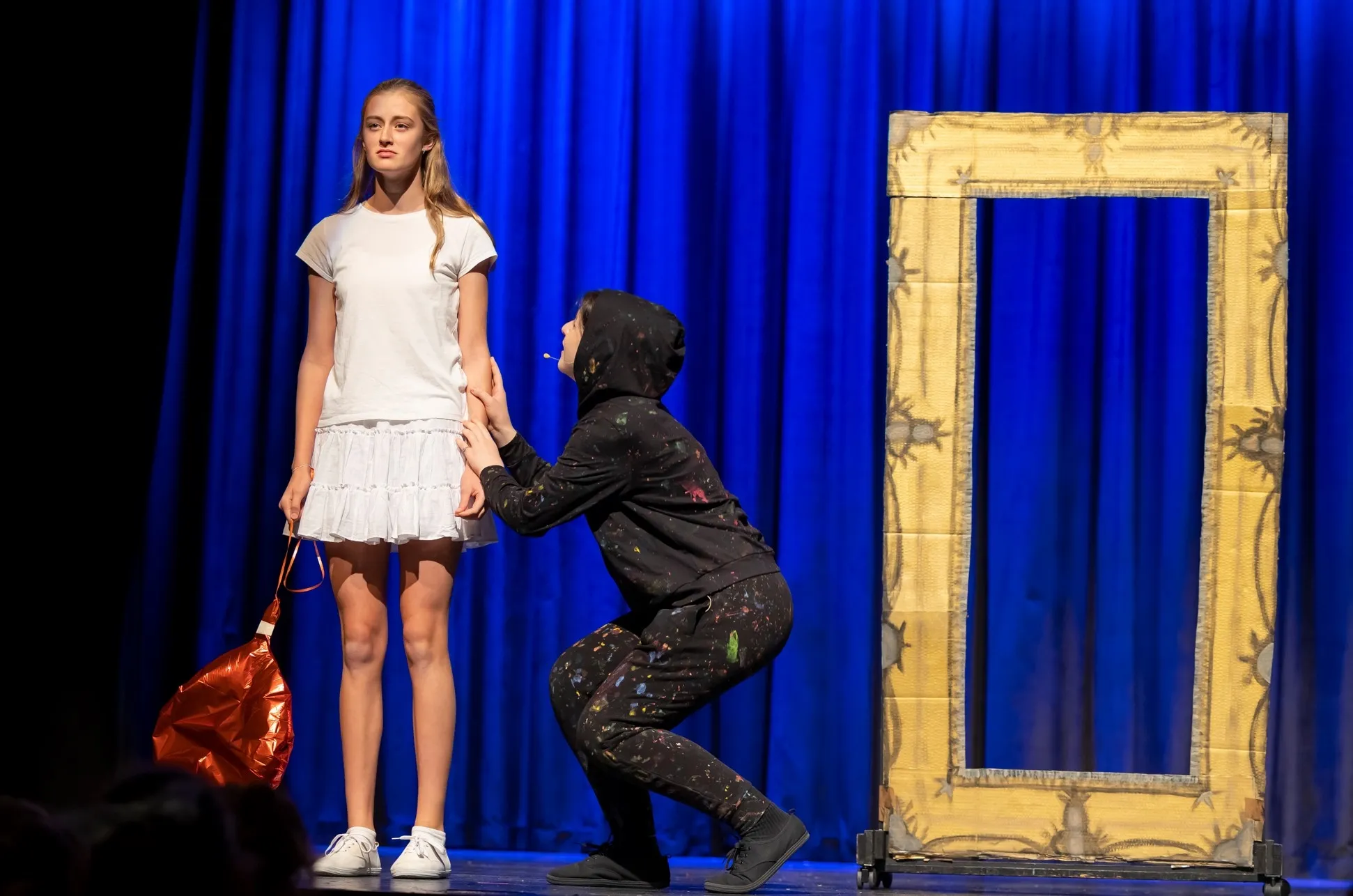

House Drama 2023


One of these props was harder to source than it may seem.


House Drama 2023
"There was a world helium shortage,” Wilson explains. “I got a price for helium balloons, and they said: ‘It’s going to be four times the price it was last year because of the shortage’.”
For our Grammarians, a balloonless performance was unacceptable, and the Backstage Club quickly devised an innovative solution with the help of the Science Department.
“One of our directors, Rosemary Nguyen (Year 12), was a part of Vexillum – a STEM-initiated project involving a High-Altitude Balloon that travelled up into the stratosphere,” Isabella explains. “She remembered that they had used helium from a big tank and that it may have had some left.
“Thanks to our amazing Lab Technicians – Andrew Lee, Alasdair Bryant, and James Robertson – and a little scientific calculation, we were able to figure out that there was enough helium to fill all the balloons we needed for our performance.
"It was a great opportunity to be resourceful with what we had available to us, and a great learning opportunity too.”
It’s this ability to adapt that sets an optimistic tone for the future of MGGS’s drama productions, which are set to remain progressive and embrace different perspectives.
"There was a world helium shortage,” Wilson explains. “I got a price for helium balloons, and they said: ‘It’s going to be four times the price it was last year because of the shortage’.”
For our Grammarians, a balloonless performance was unacceptable, and the Backstage Club quickly devised an innovative solution with the help of the Science Department.
“One of our directors, Rosemary Nguyen (Year 12), was a part of Vexillum – a STEM-initiated project involving a High-Altitude Balloon that travelled up into the stratosphere,” Isabella explains. “She remembered that they had used helium from a big tank and that it may have had some left.
“Thanks to our amazing Lab Technicians – Andrew Lee, Alasdair Bryant, and James Robertson – and a little scientific calculation, we were able to figure out that there was enough helium to fill all the balloons we needed for our performance.
"It was a great opportunity to be resourceful with what we had available to us, and a great learning opportunity too.”
It’s this ability to adapt that sets an optimistic tone for the future of MGGS’s drama productions, which are set to remain progressive and embrace different perspectives.
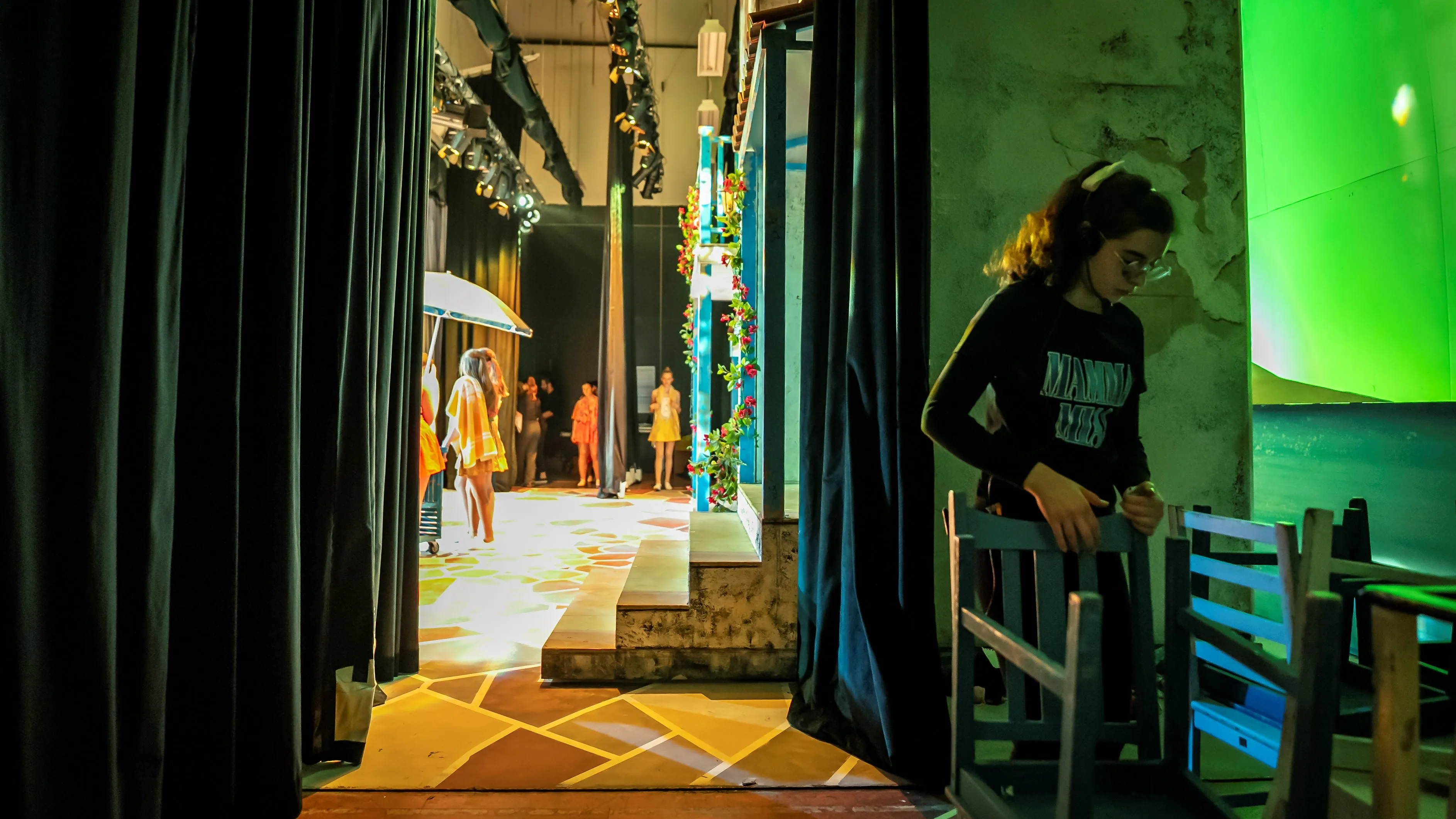

Stage Manager Isabella backstage.



Stage Manager Isabella backstage.


Stage Manager Isabella backstage.
“I think to remain innovative we have to be open to the voices of our students," Wilson says.
“They are in a different generation and are aware of particular advances in technology in a way that some of us aren’t,” acknowledging advances in AI and how this will inform script writing.
“[Students] are undaunted by technology,” Thompson agrees. “They will dive in the deep end with the equipment and get a huge buzz out of mastering it.”
As for Isabella, the Year 11 student believes that the most important part of remaining innovative is “looking towards the future”.
"I often find myself asking,” ‘What is it that we can improve?’. Often, the answer is reliant on looking at the present to identify areas of improvement for the future.
"Slowly, we have been able to make changes to the way that the systems operate, adding new lighting, upgrading technology, trialling new software, etc.
"It is incredibly exciting to think of creative ways to further develop the systems that we have in place at MGGS and expand Backstage Club to include more people who can bring their creative ideas to the table.”
- Isabella T, Year 11
“I think to remain innovative we have to be open to the voices of our students," Wilson says.
“They are in a different generation and are aware of particular advances in technology in a way that some of us aren’t,” acknowledging advances in AI and how this will inform script writing.
“[Students] are undaunted by technology,” Thompson agrees. “They will dive in the deep end with the equipment and get a huge buzz out of mastering it.”
As for Isabella, the Year 11 student believes that the most important part of remaining innovative is “looking towards the future”.
"I often find myself asking,” ‘What is it that we can improve?’. Often, the answer is reliant on looking at the present to identify areas of improvement for the future.
"Slowly, we have been able to make changes to the way that the systems operate, adding new lighting, upgrading technology, trialling new software, etc.
"It is incredibly exciting to think of creative ways to further develop the systems that we have in place at MGGS and expand Backstage Club to include more people who can bring their creative ideas to the table.”
- Isabella T, Year 11
“I think to remain innovative we have to be open to the voices of our students," Wilson says.
“They are in a different generation and are aware of particular advances in technology in a way that some of us aren’t,” acknowledging advances in AI and how this will inform script writing.
“[Students] are undaunted by technology,” Thompson agrees. “They will dive in the deep end with the equipment and get a huge buzz out of mastering it.”
As for Isabella, the Year 11 student believes that the most important part of remaining innovative is “looking towards the future”.
"I often find myself asking,” ‘What is it that we can improve?’. Often, the answer is reliant on looking at the present to identify areas of improvement for the future.
"Slowly, we have been able to make changes to the way that the systems operate, adding new lighting, upgrading technology, trialling new software, etc.
"It is incredibly exciting to think of creative ways to further develop the systems that we have in place at MGGS and expand Backstage Club to include more people who can bring their creative ideas to the table.”
- Isabella T, Year 11






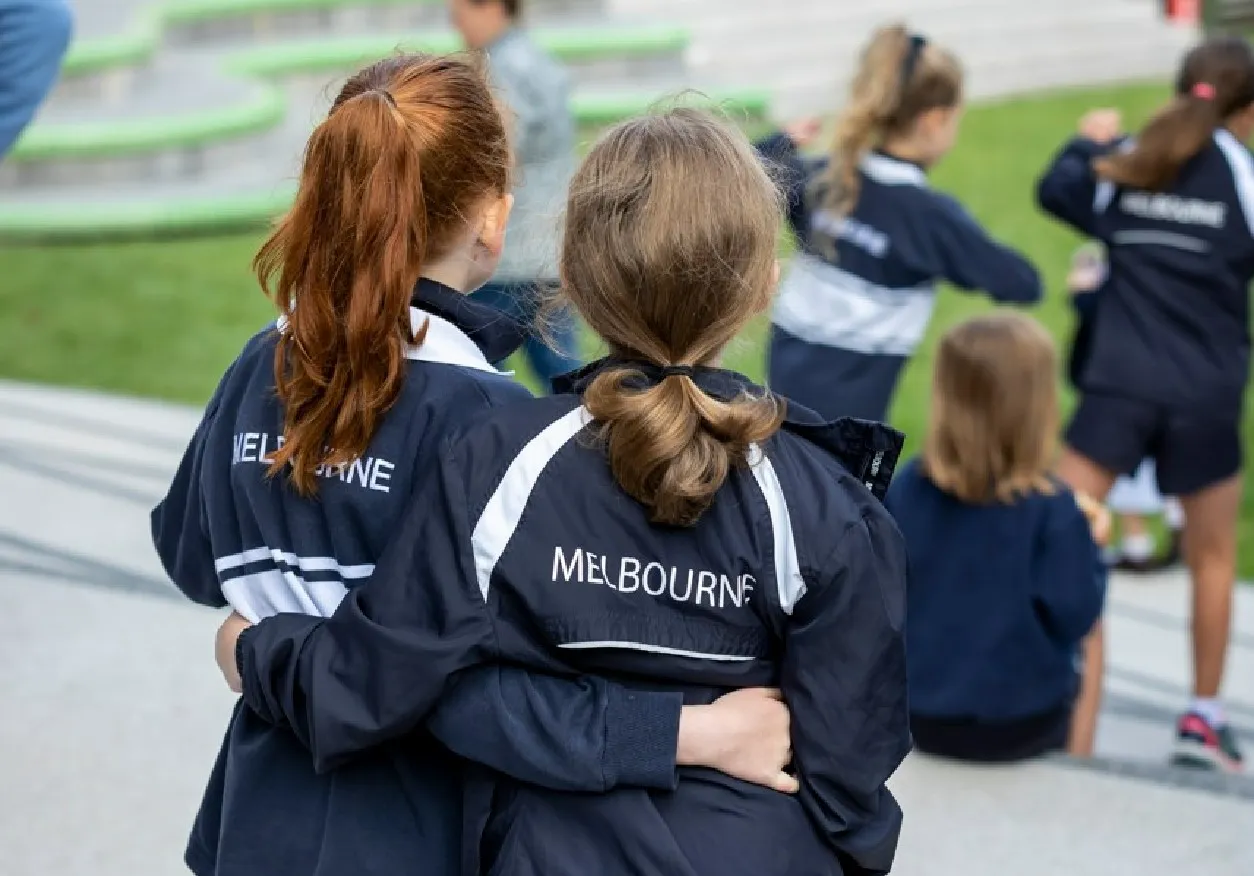

.webp)
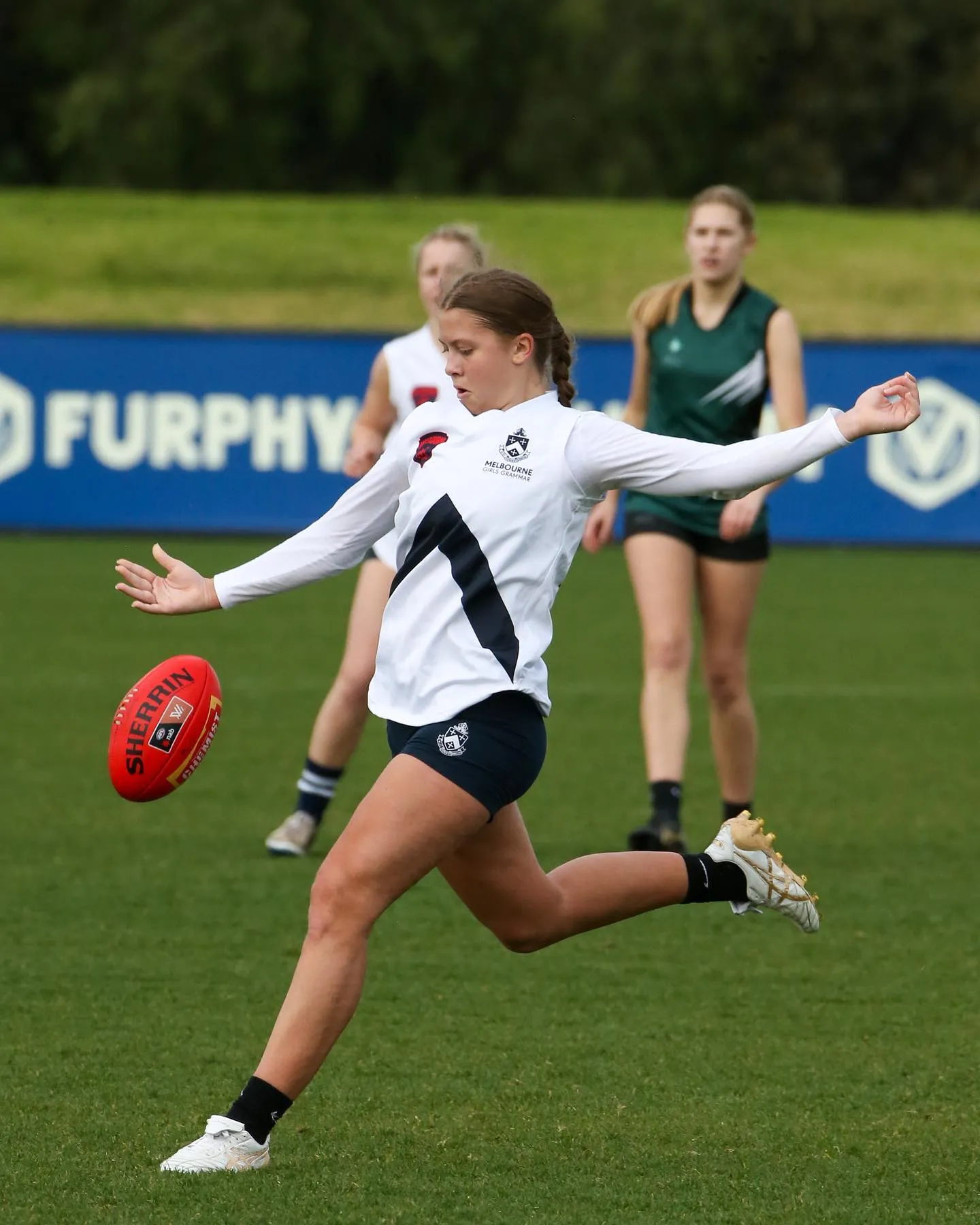
.webp)
